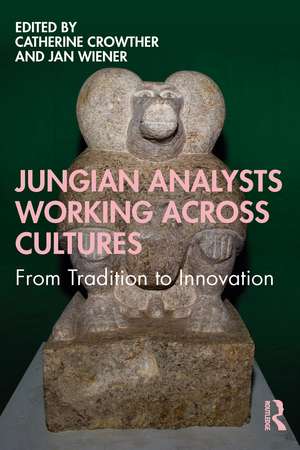Jungian Analysts Working Across Cultures: From Tradition to Innovation
Editat de Catherine Crowtheren Limba Engleză Paperback – iun 2021
Preț: 202.20 lei
Preț vechi: 212.84 lei
-5% Nou
38.69€ • 40.50$ • 32.20£
Carte tipărită la comandă
Livrare economică 31 martie-14 aprilie
Specificații
ISBN-10: 1032049804
Pagini: 340
Dimensiuni: 156 x 234 x 18 mm
Greutate: 0.49 kg
Ediția:1
Editura: Taylor & Francis
Colecția Routledge
Locul publicării:Oxford, United Kingdom
Public țintă
Postgraduate and ProfessionalCuprins
Notă biografică
Catherine Crowther is a Training Analyst for the Society of Analytical Psychology. She is involved with teaching and supervising in the UK and in Eastern Europe. She has contributed articles and chapters on analytical psychology on subjects such as silence, fairy tales, moments of meeting, eating disorders, supervision and training.
Recenzii
- Martin Schmidt, training analyst at the Society of Analytical Psychology, London and lecturer/supervisor in Jungian analysis in Russia, Ukraine, and Serbia.
- Warren Colman, supervising analyst at the Society of Analytical Psychology and Consulting Editor for the Journal of Analytical Psychology.
- Verena Kast, Professor of Psychology at the University of Zürich, training analyst at the C. G. Jung Institute and psychotherapist in private practice. She lectures throughout the world and is the author of numerous books, including A Time to Mourn and The Nature of Loving.
Jung often stated that when he entered an analytic session, he tried to forget everything he had learned in order to be totally present and open to the individual before him. The very real challenge this represents is brought to life in the thought-provoking and deeply moving personal contributions of each author. This book is an absolute must for anyone with the willingness and courage to explore and question our ethnocentric perspectives and assumptions about analysis. I recommend it highly without reservation."
- Tom Kelly, former President of the IAAP. He is a senior training analyst and supervisor, and past president of the Inter-Regional Society of Jungian Analysts and of the Council of North American Societies of Jungian Analysts.
Descriere
Jungian Analysts Working Across Cultures: From Tradition to Innovation gives a fascinating account of the wide variety of experiences of Jungian analysts working in different cultures across the world. They describe and reflect on experiences of both offering and receiving training within these cross-cultural partnerships. This is a book not only about training but is also an enlightening cultural commentary for our times. The powerful bi-directionality of cultural influence and discovery is apparent in different ways in every chapter, prompting a re-appraisal of concepts essential to the core values of Jungian practice which show an outdated adherence to culture-bound attitudes. The publication of this book is a timely reminder that when Jungian analysis as we know it is floundering in some Western countries, new projects in countries seeking to develop an analytic culture give hope for sustaining our professional practice.
